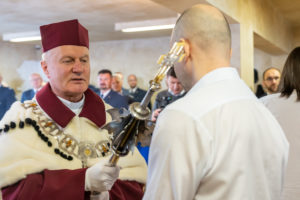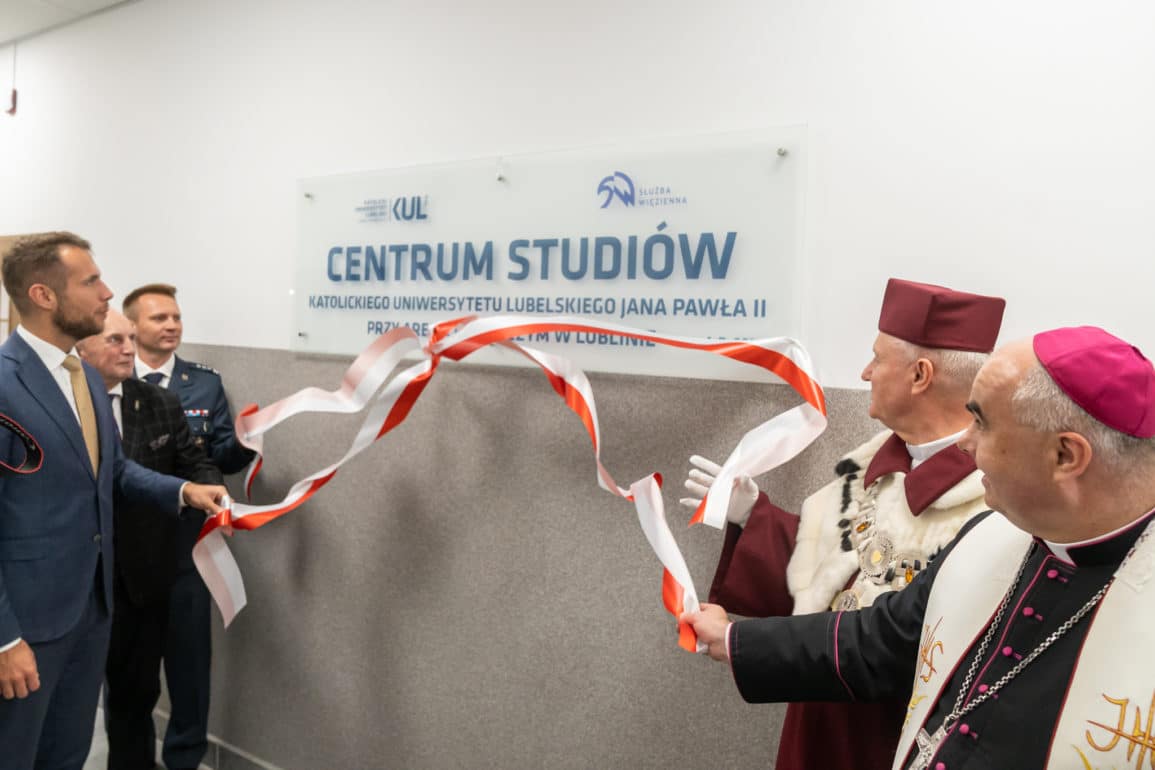The Catholic University of Lublin has officially launched a Study Centre at the detention facility in Lublin. “The Centre can be set as a model for all penitentiary units around the world,” highlighted Fr. Prof. Mirosław Kalinowski, Rector of the Catholic University of Lublin. “Of prime importance for us is not to waste time in a place we are in right now,” comment the detainees, who are new University students.
The inauguration of the academic year at the Detention Facility in Lublin began with Holy Mass in the local chapel, followed by the opening ceremony of the Catholic University of Lublin Study Centre. This important initiative of the Catholic University of Lublin is meant to enable convicts to receive higher education and to acquire vital ethical and humanistic values. Such objectives are set out in the letter of intent signed earlier with the Central Board of the Penitentiary Service.
As the Rector of the Catholic University of Lublin, Fr. Prof. Mirosław Kalinowski, stressed, the Study Centre “is becoming not only a leading centre of this type in Poland but can also be set as a model for all penitentiary units around the world. It will hold educational projects and offer postgraduate courses.” Father Rector added that the success of the endeavour relies on the University’s care for academic procedures and the Prison Service’s care for the safety and security of the process.

Letters to the attendees of the inauguration were sent by the Papal Almoner Cardinal Konrad Krajewski and Minister of Education and Science Przemysław Czarnek. The former recalled the words of Pope Francis, who observed that “in prison it is not enough just to ransom guilt, but real rehabilitation of the convict is necessary.” Consequently, as Cardinal Krajewski wrote, When it is lacking, serving a sentence is reduced solely to the instrument of punishment and social retaliation. This, in turn, is harmful both to the person and to society. Poland’s Minister of Education and Science expressed a hope that the nearest months would be a “time for academic growth and unique accomplishments for the Centre.”
The launch of the Catholic University of Lublin Study Centre was favourably assessed by representatives of the Penitentiary Service. – You are offered a great chance. All of you who think about the future; those of you, who wish to change their future for the better; those of you, who have particular resources and potential, think rationally, are offered a great chance. I urge you to embrace this opportunity, said Deputy Director General of the Penitentiary Service, Colonel Krzysztof Stefanowski.
Secretary of state in the Ministry of State Assets Jan Kanthak observed that “work and education are the prime paths to find oneself in a new reality after serving a sentence.” Deputy minister congratulated the detainees on their decisions to continue education at the Catholic University of Lublin and pointed out: – Reality is changing on a daily basis and after you leave this place, you will need to adapt and recognise the new reality. Education and work are the most appropriate tools to do it.
The matriculation of students took place during the official inauguration of the Catholic University of Lublin Study Centre at a Detention Facility in Lublin, attended also by e.g. Bishop Adam Bap from the Archdiocese of Lublin and Prof. Susannah Heschel, daughter of the patron of the University’s Heschel Centre. The launch of the Study Centre was possible e.g. thanks to the support of the Ministry of Justice, Ministry of State Assets and the Ministry of Education and Science.
The new students include several inmates who were recruited for the first year of the MA course in Family Science (specialisation in social environment animation), launched only this year. This specialisation is not only relevant to the socio-economic needs (labour market), but also takes into account the formal and legal situation of the inmates. Another specialisation that is of great interest to the student-inmates is the assistant of a dependent person.
– Personal growth is important for me as I do not want to waste time in a place I am in right now. I want to develop myself further; this is going to be my third degree, as I previously studied law as well as business and management – said Maciej, who said that the first class in Family Science resembles those that take place outside the detention facility. He also indicated that the inmates Make use of the reference materials offered by lecturers and people from outside the facility. We also have access to a library. Piotr, another inmate-student added: – This is going to be a major experience for me; I would like my life to be enriched with something, now that I am in prison. I do not want my time to be wasted here. Piotr studied in the past, as many as 30 years ago.
The inauguration lecture titled “Why, after the tragic experiences of the 20th century, armed conflict has broken out again in Eastern Europe today” was delivered by Fr. Prof. Marcin Składanowski from the Institute of Theological Sciences. The ceremony was attended by the University Choir.
***
As of 2013, nearly 30 students serving time in a Detention Facility in Lublin have earned their degrees from the Catholic University of Lublin. It is a unique endeavour with proven social rehabilitation results, since as many as 80 percent of the alumni do not re-offend after leaving the prison.
Preparations for the launch of the Catholic University of Lublin Study Centre at the Detention Facility in Lublin began in April 2022.
Studies undertaken by persons deprived of liberty, as proven by research and experience resulting from the implementation of academic education in detention centres and prisons, has a positive impact on prisoners. Studying enhances their sense of dignity and self-esteem, allows them to feel like legitimate members of society, enhances their knowledge and skills, which can all be used after their sentence is over. Studying under the guidance of lecturers also teaches empathy, cooperation and responsibility and prompts a willingness to make amends for the offences committed.










